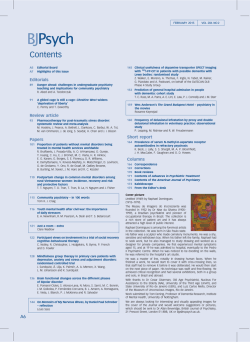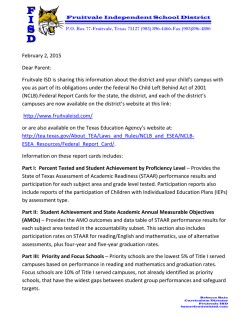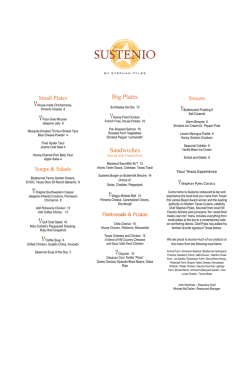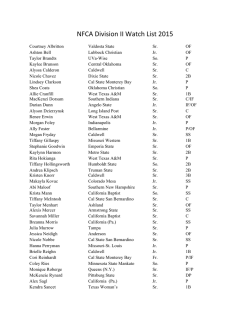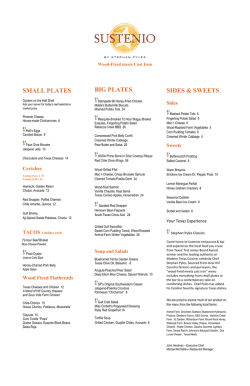
Brochure (PDF) - UT Southwestern
UT Southwestern Department of Psychiatry Update Series Presents: Brain Stories The Science Behind Prevention, Detection, & Effective Intervention for Mental Illness A few topics include: JAN U ARY 31, 20 15 9 A. M. TO 4:30 P. M. Join fellow clinicians in deepening your understanding of the impact of translational neuroscience and genetics research on real-world clinical practice A Brain Primer review Biologic Markers in Psychosis Early Detection in Autism Spectrum The Aging Brain Addiction Event Location UT Southwestern Medical Center Simmons Biomedical Research Building Excellence in Education Auditorium (NB2.EEF) 6000 Harry Hines Blvd Dallas, TX 75390 Ph 214.648.3138 [email protected] Registration Information Registration Fee: $150 $85 Students/Residents: $20 Complimentary* UT Southwestern Nurses: Complimentary* *All participants need to register online at : https://cme.utsouthwestern.edu/content/rp1501c AG EN DA 8:15-9 9-9:15 9:15-10 10-10:45 10:45-11 11-11:45 11:45-12 12-1 1-1:45 1:45-2:45 2:45-3 3-3:45 3:45-4:30 Registration & Coffee/Continental Breakfast Why Learn about the Brain? Adam Brenner, MD Neuroplasticity: How Synaptic Changes can Alter Behavior David Self, PhD Psychosis: Moving from Symptoms to Biologic Markers Carol Tamminga, MD Break Autism: Neuroscience & Early Detection Peter Tsai, MD, PhD Interactive Learning Activity Laura Howe-Martin, PhD Break for Lunch Detecting Preclinical Dementia Denise Park, PhD The Mind, the Brain and Psychotherapy Robert Michels, MD Break The “Addicted” Brain Bryon Adinoff, MD Interactive Learning Activity & Summary Laura Howe-Martin, PhD & Adam Brenner, MD Brain Stories Course Co-Directors Adam Brenner, MD - Associate Professor and Distinguished Teaching Professor at UT Southwestern, and Director of Residency Training and Vice Chair for Education in the Department of Psychiatry Laura Howe-Martin, PhD – Assistant Professor at UT Southwestern Medical Center, and Associate Director of Continuing Education in the Department of Psychiatry SP EA KE RS Bryon Adinoff, M.D. - Dr. Adinoff is the Director of Research in Mental Health at the VA North Texas Health Care System and is the Distinguished Professorship of Alcohol and Drug Abuse Research in the Department of Psychiatry at University of Texas Southwestern Medical Center in Dallas. Dr. Adinoff has published widely on the biology and treatment of addiction, co-edited the book Neuroimaging in Addiction, and is the Editor-in-Chief of the American Journal of Drug and Alcohol Abuse. Dr. Adinoff’s laboratory conducts primarily human translational research, using a variety of pharmacological and behavioral probes to explore the brain and stress-hormone disruptions associated with cocaine and alcohol use disorders and, more recently, addicted sunbed users. Robert Michels, M.D. - Dr. Michels is the Walsh McDermott University Professor of Medicine, Cornell University, and University Professor of Psychiatry, Weill Medical College of Cornell University. A graduate of the University of Chicago and the Northwestern University Medical School, Dr. Michels trained in Psychiatry at Columbia University and the New York State Psychiatric Institute and in Psychoanalysis at the Columbia University Center for Psychoanalytic Training and Research. He served as the Stephen and Suzanne Weiss Dean of Cornell University Medical College and Provost for Medical Affairs of Cornell University, and served as the Barklie McKee Henry Professor and Chairman of the Department of Psychiatry, Cornell University Medical College, and Psychiatrist-in-Chief of The New York Hospital, Payne Whitney Clinic and Westchester Division. He is the author of more than 300 scientific articles, is Deputy Editor of The American Journal of Psychiatry, former Joint Editor-in-Chief of The International Journal of Psychoanalysis, and is or has been a member of several editorial boards. Peter Tsai, M.D., Ph.D. - Dr. Tsai is an assistant professor in the departments of Psychiatry, Neurology and Neurotherapeutics, Pediatrics, and Neuroscience at UT Southwestern Medical Center. He is a child neurologist and physician scientist who is fellowship trained in child behavioral neurology. At the Center for Autism and Developmental Disabilities, he cares for children with neurodevelopmental disabilities including autism, with a specialty interest in the cognitive, developmental, and behavioral sequelae of patients with cerebellar disorders. He also runs a research laboratory at UT Southwestern Medical Center investigating the molecular and circuit based mechanisms underlying autism. Brain Stories SP EA KE RS Denise C. Park, Ph.D. - Dr. Park is Distinguished University Professor of Behavioral and Brain Sciences and University of Texas Regents Research Scholar at the University of Texas at Dallas where she is founder and Co-director of the Center for Vital Longevity. She is an expert in the cognitive neuroscience of aging, and focuses her research on healthy adults across the entire lifespan. Dr. Park directs the Dallas Lifespan Brain Study, an NIA-funded longitudinal study that integrates multiple biomarkers, including amyloid imaging, to understand how the brain adapts to neural insults and how cognitive function is affected. She is a fellow of multiple associations including the American Association for the Advancement of Science, and has held national offices in both the Association for Psychological Sciences and the American Psychological Association. Dr. Park has published more than 150 articles and six books on the brain and aging. She has been continuously funded by the National Institute on Aging for more than 30 years, including a prestigious MERIT Award. David Self, Ph.D. - Dr. David Self holds the Wesley Gilliland Professorship in Biomedical Research, and is Director of the Psychiatry Neuroscience Division at UT Southwestern Medical Center in Dallas, Texas. He received his Ph.D. in Pharmacology from the University of California at Irvine, and conducted postdoctoral work in the Division of Molecular Psychiatry at Yale University School of Medicine. His work focuses on how neural and molecular changes associated with the addiction process contribute to changes in drug selfadministration and relapse behavior. His research uses rodent self-administration models to study alterations in dopamine receptor signaling pathways, endogenous opiate systems, and neuroplasticity associated with cocaine and heroin addiction. He also studies neurobiological changes associated with extinction from drug self-administration as potential therapeutic mechanisms to promote abstinence. Dr. Self is a member of several professional societies including the Society for Neuroscience and the Society for Biological Psychiatry, and is a recipient of the Presidential Early Career Award for Scientists and Engineers and the Daniel H. Efron Research Award from the American College of Neuropsychopharmacology. Carol A. Tamminga, M.D. - Dr. Tamminga is a Professor, Chairman of Psychiatry and Chief of Translational Neuroscience Research in Schizophrenia at the University of Texas Southwestern Medical School. In February of 2003, Dr. Tamminga was appointed to full professor at the University of Texas Southwestern Medical School, where she developed a Clinical Research Laboratory, a human postmortem Brain Collection, and an in vivo Human Imaging Laboratory for normal and schizophrenia research. The goal of Dr. Tamminga’s research is to examine and understand the mechanisms underlying schizophrenia, especially its most prominent symptoms, psychosis and memory dysfunction, in order to build rational treatments for the illness. Her ultimate goal is to base novel pharmacologies for psychosis and memory dysfunction on these observations and to use the altered in vivo imaging and postmortem molecular changes as biomarkers and targets for identifying animal models of disease and novel active pharmaceuticals. Brain Stories Credit Designation Accreditation The University of Texas Southwestern Medical Center is accredited by the Accreditation Council for Continuing Medical Education (ACCME) to provide continuing medical education for physicians. The University of Texas Southwestern Medical Center designates this live activity for a maximum of 6.0 AMA PRA Category 1 Credit(s)TM. Physicians should only claim credit commensurate with the extent of their participation in the activity. UT Southwestern Medical Center is an approved provider of psychology continuing education per the Texas State Board of Examiners of Psychologists per rule 461.11(c) 1A. This course is approved for 6.0 hours. UT Southwestern Medical Center is approved by the Texas State Board of Examiners of Professional Counselors. This activity qualifies for 6.0 hours. UT Southwestern Medical Center is an approved provider of social work continuing education per the social work licensing rule 781.511 (c1). This course is approved for 6.0 contact hours (0.6 CEU’s). UT Southwestern University Hospitals is an approved provider of continuing nursing education by the Texas Nurses Association, an accredited approver by the American Nurses Credentialing Center’s Commission on Accreditation. This activity provides 6.0 contact hours O BJE CTI VE S Increase knowledge of up-to-date research regarding advances in neuroscience Improve ability to educate patients and families on complicated concepts, such as “genetic predisposition” and “neurological deficits” Recognize and integrate new findings in translational research on common psychiatric conditions into routine clinical care and patient education Brain Stories Who Should Attend This course is designed for psychiatrists, psychologists, psychiatric nurses, LPCs, social workers, residents, fellows, students, and other mental health professionals interested in learning about the ethical issues associated with recommending alternative psychotherapies. Purpose and Content This course will increase participants’ knowledge of the various ethical issues surrounding recommending various psychotherapies. Conflict of Interest All persons in the position to control the content of an education activity are required to disclose all relevant financial relationships in any amount occurring within the past 12 months with any entity producing, marketing, re-selling, or distributing health care goods or services consumed by, or used on patients along with that of their spouses or significant other. A primary mechanism to resolve identified conflicts of interest is a content review that is prior to the activity. Discussion of Off-Label Use This course is meant to educate practitioners with what is currently in use and what may be available in the future, so there may be “off-label” use discussed in the presentations. Speakers have been requested to inform the audience when off-label use is being discussed. Cancellation Policy The Office of Continuing Medical Education reserves the right to limit registration and cancel course, no less than one week prior to the course, should circumstances make this necessary. Additional Information For additional information, please call The Office of Continuing Medical Education, 214-648-3138, 1800-688-8678, or e-mail [email protected] Program Accessibility We accommodate people with disabilities. Please call 214-648-3138 for more information, or mark the space indicated on the registration form. To ensure accommodation, please register as soon as possible. The University of Texas Southwestern Medical Center is committed to providing programs and activities to all persons regardless of race, color, national origin, religion, sex, age, veteran status, or disability. The North Texas Society of Psychiatric Physicians (NTSPP) has generously provided sponsorship for this event. Brain Stories
© Copyright 2026
